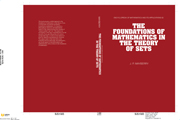Book contents
- Frontmatter
- Contents
- Preface
- Part One Preliminaries
- Part Two Basic Set Theory
- Part Three Cantorian Set Theory
- Part Four Euclidean Set Theory
- 8 Euclidean Finitism
- 9 The Euclidean Theory of Cardinality
- 10 The Euclidean Theory of Simply Infinite Systems
- 11 Euclidean Set Theory from the Cantorian Standpoint
- 12 Envoi
- Appendix 1 Conceptual Notation
- Appendix 2 The Rank of a Set
- Bibliography
- Index
8 - Euclidean Finitism
from Part Four - Euclidean Set Theory
Published online by Cambridge University Press: 05 March 2012
- Frontmatter
- Contents
- Preface
- Part One Preliminaries
- Part Two Basic Set Theory
- Part Three Cantorian Set Theory
- Part Four Euclidean Set Theory
- 8 Euclidean Finitism
- 9 The Euclidean Theory of Cardinality
- 10 The Euclidean Theory of Simply Infinite Systems
- 11 Euclidean Set Theory from the Cantorian Standpoint
- 12 Envoi
- Appendix 1 Conceptual Notation
- Appendix 2 The Rank of a Set
- Bibliography
- Index
Summary
The serpent in Cantor's paradise
The foundations of modern mathematics, based, as I have explained, on Cantor's extension of the classical conception of the finite, are obscured by a miasma of irrelevancies and misconceptions. But the plain fact is there is nothing obviously wrong with Cantorian set theory. When Cantor first proposed that species previously regarded by everyone as genuinely infinite – the natural numbers, the real numbers, the points in space, etc. – could be assigned definite, and indeed different, sizes, he was greeted with scepticism, a perfectly reasonable scepticism given the radical nature of his proposal. Who could have said, at the outset, that such an attempt would not come to grief on what Bolzano called the “paradoxes of the infinite”?
In fact, as we now know, that did not happen. What Cantor saw only dimly and incompletely in the early 1870s had become a clear and powerful vision by the end of the 1880s. The light shed by Cantor's doctrines and theorems on the foundations of mathematical analysis so impressed his younger contemporaries that by the end of the century his approach to analysis had carried all before it. Even the discovery of the so-called “paradoxes of set theory” at the beginning of the twentieth century did no more than briefly slow down the steady advance of Cantorian ideas.
Information
- Type
- Chapter
- Information
- The Foundations of Mathematics in the Theory of Sets , pp. 261 - 299Publisher: Cambridge University PressPrint publication year: 2001
